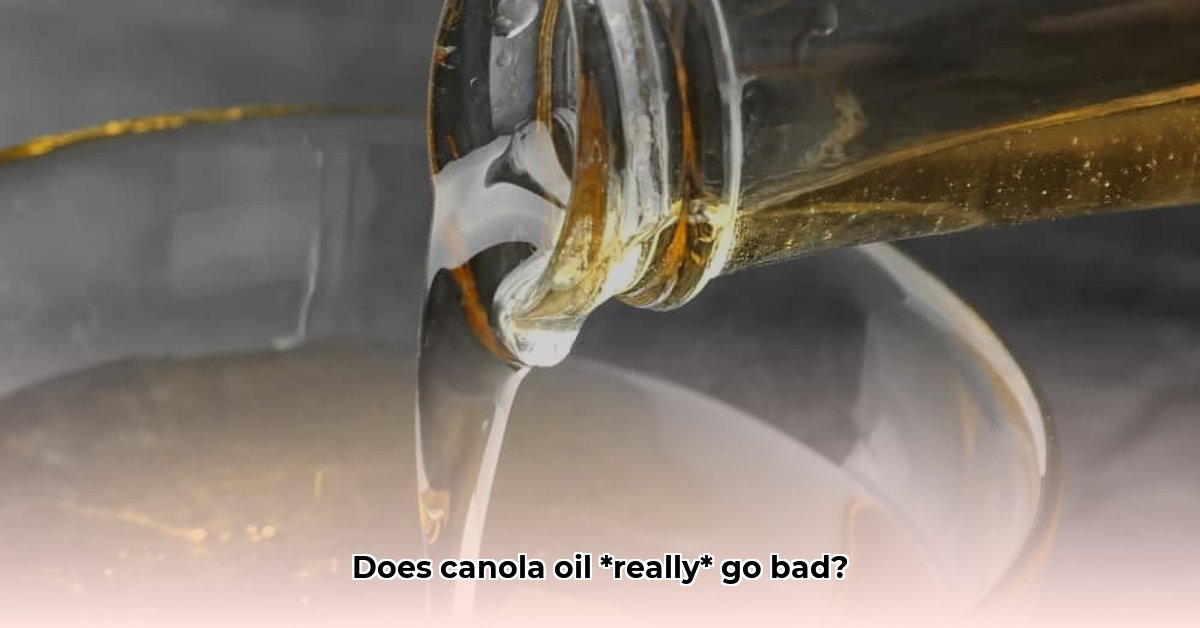Does that bottle of canola oil lurking in your pantry have a ticking expiration clock? The answer is yes, but don’t panic! This comprehensive guide will equip you with everything you need to know about canola oil storage, spoilage, and how to keep your oil fresh and flavorful.
Decoding Canola Oil Spoilage
Canola oil, like all oils, has a shelf life. It won’t grow mold, but it can go rancid, impacting both flavor and potentially, health. Let’s explore how to identify spoiled oil and understand the science behind it.
How to Tell if Your Canola Oil is Rancid
The sniff test is your most reliable tool. Rancid oil can have a variety of unpleasant odors, from paint thinner and crayons to a fishy or sour smell. If it smells off, it likely is.
A slight change in color, towards a darker, murkier hue, can also suggest spoilage. Cloudiness in refrigerated oil is usually harmless and due to solidifying fats, but if accompanied by a bad smell, it’s best to discard it. Finally, a tiny taste test (dip a piece of bread, do not swallow) can confirm rancidity with a bitter or stale flavor. If unsure, err on the side of caution and replace the oil.
The Science of Rancidity: Oxidation Explained
Rancidity occurs when the oil’s fatty acids react with oxygen, a process called oxidation. Light, heat, and air exposure accelerate this process. While a small amount of rancid oil probably won’t make you sick, it can cause digestive upset and potentially introduce harmful compounds. Some studies suggest links between oxidized oils and long-term health issues like heart disease, though research is ongoing.
Mastering Canola Oil Storage
Proper storage significantly extends your oil’s lifespan. Here’s a breakdown:
Shelf Life at a Glance
| Storage Location | Unopened | Opened |
|---|---|---|
| Pantry | 1-2 years | 6-12 months |
| Refrigerator | Up to 2 years | 1-2 years |
| Freezer | Not Recommended | Not Recommended |
Note: “Best by” dates are guidelines. Always rely on your senses to determine freshness.
Optimal Storage Practices
- Cool, Dark, and Dry: Store unopened and opened bottles in a cool, dark pantry away from heat sources.
- Airtight Container: Always ensure the cap is tightly sealed after opening to minimize oxidation.
- Consider Dark Glass: Transferring oil to dark glass bottles further protects it from light.
- Avoid Freezing: Freezing canola oil is generally not recommended as it can alter the texture and isn’t necessary for preservation given its relatively long shelf life when stored properly.
Canola Oil FAQs
Q: My oil is cloudy. Is it still good?
A: Cloudiness in refrigerated oil is likely due to solidified fats and is usually harmless. Let it come to room temperature. If a bad smell accompanies the cloudiness, discard it.
Q: What are good canola oil alternatives?
A: Olive oil, avocado oil, and sunflower oil are excellent alternatives, each with its own unique flavor profile and best uses. Some research suggests that extra virgin olive oil may have some health benefits due to its higher antioxidant content.
Q: How do I dispose of rancid oil?
A: Never pour it down the drain! Seal it in a non-recyclable container and dispose of it in the trash. Check local regulations for specific guidelines. For small amounts, absorb with paper towels before discarding
Q: How often can I reuse canola oil for frying?
A: Generally, 8-10 uses or 1-2 weeks, especially if filtered after each use. After that point, the oil starts to degrade, producing potentially harmful compounds like acrolein.
Q: Is canola oil healthy?
A: Canola oil is low in saturated fat and a good source of monounsaturated fats. However, there’s ongoing debate about its health impacts due to its processing methods. Further research is needed to determine long-term health effects.
Beyond the Basics: Ongoing Research
While we’ve covered the essentials of canola oil storage and spoilage, research in food science is constantly evolving. Scientists are exploring various factors that may influence oil stability, including different processing methods, packaging innovations, and the role of antioxidants. These ongoing investigations underline the importance of staying informed and adapting our practices as new information emerges.
- Mindfulness Activities PDF Offers Free Worksheets and Exercises - February 23, 2026
- Meditation Guide Book Picks from Top Mindfulness Teachers - February 22, 2026
- Best Books to Start Meditation for Beginners and Skeptics - February 21, 2026













